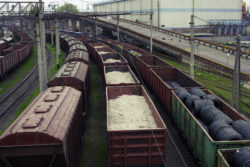 According to a recent online article from Omaha.com, twelve former Union Pacific Railroad workers have each filed their own lawsuit in the U.S. District Court located in Omaha, Neb.
According to a recent online article from Omaha.com, twelve former Union Pacific Railroad workers have each filed their own lawsuit in the U.S. District Court located in Omaha, Neb.
The plaintiffs have contracted various forms of alleged railroad workers cancer that they believe was caused by ongoing exposure to hazardous material that is a routine part of the railroad industry.
The railroad workers cancer lawsuits document exposure to diesel fuel exhaust fumes, which are notoriously toxic and contain unsafe levels of benzene.
Additionally, exposure to substances such as coal tar creosote, manganese, and mineral dust and fibers are mentioned as likely causes of the types of railroad workers cancer the individual plaintiffs have been forced to endure.
The complainants in these new cases have been diagnosed with lymphoma—cancer of the lymph nodes, pancreatic cancer, and cancer of the head and neck. Further research indicates that benzene exposure has been implicated in the development of railroad workers cancer in many forms such as cancer of the kidney, bladder, rectum, esophagus, stomach, colon, throat, skin, and lungs.
Plaintiffs and FELA
The twelve individual plaintiffs, according to the Omaha.com article, have each filed suit under the Federal Employers Liability Act (FELA). FELA was passed in 1908 and was at first aimed at protecting railroad workers. The act requires that employers provide safe working environments for their employees.
Today, FELA operates like additional insurance for the worker injured on the job. This secondary compensation source for sufferers of railroad workers cancer is only accessible through the legal process. Plaintiffs must prove in a court of law that the employer was negligent in establishing safety protocol for workers and in executing protections.
To be in compliance with FELA, an employing railroad would need to regularly audit worker environments for health threats, remove such hazards or, where their use is necessary, post warnings and provide effective protective gear.
If less hazardous materials are available that could be used, an employing railroad should choose the least toxic product for worker safety and well-being.
Union Pacific Railroad Workers Cancer Lawsuits
The complainants hail from six states and allege that Union Pacific Railroad was negligent in the removal of materials deemed to be dangerous. The company also supposedly failed to regularly test and monitor work sites for the presence of hazardous materials.
The former employees filing these lawsuits have worked for Union Pacific as far back as the 1960s and continuing into the 1990s. The company has a presence in 23 different U.S. states with about 23,000 miles of associated track.
There is a large Nebraska contingent of Union Pacific employees numbering close to 8,000. Most of these are located at the railroad’s Omaha headquarters and a large rail yard in North Platte, Neb. called Bailey Yard. There are another 35,000 employees of this second-largest railroad company nationwide.
Did My Job Cause My Cancer?
Railroad workers who develop cancer may not realize that their on-the-job exposures to hazardous materials could be the cause. Persons in such a situation may benefit from a consultation with a knowledgeable FELA attorney.
Do YOU have a legal claim? Fill out the form on this page now for a free, immediate, and confidential case evaluation. The attorneys who work with Top Class Actions will contact you if you qualify to let you know if an individual railroad worker cancer lawsuit or class action lawsuit is best for you. [In general, railroad worker cancer lawsuits are filed individually by each plaintiff and are not class actions.] Hurry — statutes of limitations may apply.
ATTORNEY ADVERTISING
Top Class Actions is a Proud Member of the American Bar Association
LEGAL INFORMATION IS NOT LEGAL ADVICE
Top Class Actions Legal Statement
©2008 – 2025 Top Class Actions® LLC
Various Trademarks held by their respective owners
This website is not intended for viewing or usage by European Union citizens.
Get Help – It’s Free
Join a Free Railroad Worker Cancer Class Action Lawsuit Investigation
If you qualify, an attorney will contact you to discuss the details of your potential case at no charge to you.
Please Note: If you want to participate in this investigation, it is imperative that you reply to the law firm if they call or email you. Failing to do so may result in you not getting signed up as a client, if you qualify, or getting you dropped as a client.
E-mail any problems with this form to:
[email protected].
Oops! We could not locate your form.












